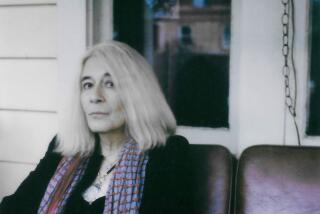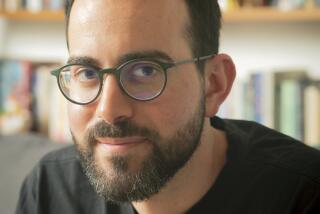‘Why This World: A Biography of Clarice Lispector’ by Benjamin Moser
Why This World
A Biography of Clarice Lispector
Benjamin Moser
Oxford University Press: 480 pp., $29.95
The writer Clarice Lispector earned that strange and occasional honor of fame: She became known by her first name alone. To this day, people call her “Clarice,” and something can even be described as “Claricean.” Such familiarity is strange, though, given Clarice has always been such an enigmatic figure in Brazilian letters.
“Why This World,” a new biography of the writer by Benjamin Moser, treats Clarice and her many mysteries very gently. Moser carefully unwraps the very raw, intimate character behind her very introspective books. Her life was a mixture of public and private elements -- the details of her life were off-limits, but she would share her innermost thoughts on the page. She wrote, “Alongside my desire to defend my privacy, I have the intense desire to confess in public and not to a priest.”
When the young Clarice emerged on the literary scene in 1943 with her first novel, “Near to the Wild Heart,” a magazine reported: “There is a great curiosity surrounding the person of Clarice . . . only a few rare people have been lucky enough to talk to her. ‘Clarice Lispector doesn’t exist,’ some say. ‘It’s the pseudonym of someone who lives in Europe.’ ‘She’s a beautiful woman,’ claim others. ‘I don’t know her,’ says a third. ‘But I think she’s a man. I’ve heard he’s a diplomat.’ ”
The writer and critic Sérgio Milliet wrote about her “strange and even unpleasant name, likely a pseudonym,” and he wasn’t entirely off the mark. Clarice Lispector was born Chaya Lispector in Chechelnik, Ukraine, in 1920 -- her family briefly stopped there while en route to Brazil to escape vicious pogroms and starvation in Eastern Europe. She was the youngest of three daughters, and she was conceived in an effort to cure her mother of syphilis. Moser surmises that the writer’s mother had been raped by Russian soldiers during a raid on their village and contracted syphilis. At the time, having a baby was considered to be one way of curing syphilis -- and Chaya means “life” in Hebrew.
Eventually, the Lispectors made it to Brazil and struggled their way into a life there. They changed their names: Pinkhas, Clarice’s father, became Pedro. Mania, her mother, became Marieta, and Chaya became Clarice. Pedro Lispector became a peddler, selling clothes on the street. He brought up his three daughters as well as he could, even after Clarice’s mother died in 1930, having failed to recover from her disease.
The loss of her mother forever haunted Clarice, especially given that she was conceived in order to renew Marieta’s life : “I was guilty from birth, she who was born with the mortal sin.” As a child, she would dream up stories in which miraculous events saved her mother’s life; as a writer, Clarice would return again and again to the theme of lifesaving miracles too.
The transition from being Chaya to being Clarice, from having a mother to being motherless, and from her Ukrainian birth to her Brazilian citizenship -- all of these were central to the powerful angst that Clarice suffered. “I lost myself so many years ago that I hesitate to try to find myself again,” she wrote. “They gave me a name and alienated me from myself.”
Where did Clarice belong? She wrote: “I am sure that in the cradle my first wish was to belong. . . . For reasons that do not matter here, I must have somehow felt that I didn’t belong to anything or anyone.” Was this a voicing of the dilemma of all Jews whose lives were brutally rearranged by the violence of the 20th century? The Lispectors unquestionably had their lives fractured by pogroms and exile, but Clarice knew no country other than Brazil as she grew up. She had to be Brazilian. “I am Brazilian,” she said, “and that is that.” Others questioned her identity, however, and she hated it. The journalist Amylton de Almeida wrote, “Clarice was called alienated, cerebral, ‘intimist’ and tedious. . . . She only reacted when offended by the stupid accusation that she was a foreigner.” But there was good reason for the questioning. She did speak with an accent, which was put down to a speech impediment. Late in life, she wore strange clothes that she had bought when she lived abroad. A friend wrote that “Clarice was a foreigner on earth, going through the world as if she’d arrived in the dead of night in an unknown city amidst a general transport strike.”
Another reason for these questions of belonging was that Clarice’s written language has a foreign ring to it. “What cannot be expressed only comes to me through the breakdown in language,” she explained in the afterword to “Near to the Wild Heart.” During her lifetime -- she died in 1977 -- some critics accused her of having more in common with English writers than Brazilian ones. And yet most of these critics wound up vehemently claiming her as their own. The poet Lêdo Ivo put it perfectly: “There will probably never be a tangible and acceptable explanation for the language and style of Clarice Lispector. . . . This borderland prose of immigrants and emigrants has nothing to do with any of our illustrious predecessors. . . . You could say that she, a naturalized Brazilian, naturalized a language.”
Certainly, Clarice is an irreducible subject for biography with her many secrets and oddities, but “Why This World” is an excellent feat of portraiture. In 1964, Clarice wrote, “if I had to give a title to my life it would be: in search of the thing itself.” With Moser’s book, many readers will find that she is quite a thing to discover indeed.
Randall is a critic and the translator, most recently, of “A Hero of Our Time” by Mikhail Lermontov for Penguin Classics and Yevgeny Zamyatin’s “We” for Modern Library Classics.
More to Read
The biggest entertainment stories
Get our big stories about Hollywood, film, television, music, arts, culture and more right in your inbox as soon as they publish.
You may occasionally receive promotional content from the Los Angeles Times.










